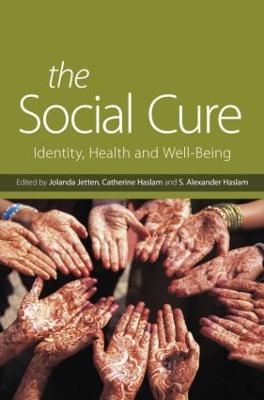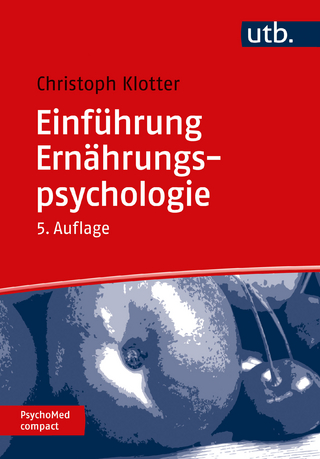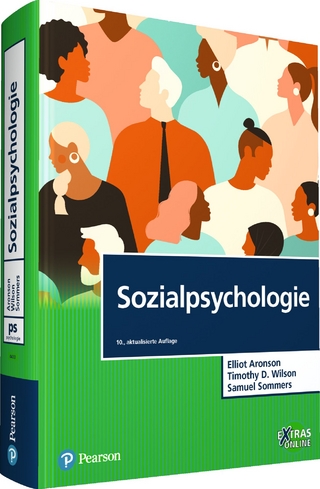
The Social Cure
Psychology Press Ltd (Verlag)
978-1-84872-021-3 (ISBN)
This edited book brings together the latest research on how group memberships, and the social identities associated with them, determine people’s health and well-being. The volume provides a variety of perspectives from clinical, social, organisational, and applied fields that offer theoretical and empirical insights into these processes and their consequences. The contributions present a rich and novel analysis of core theoretical issues relating to the ways in which social identities, and factors associated with them (such as social support and a sense of community), can bolster individuals’ sense of self and contribute to physical and mental health. In this way it is shown how social identities constitute a ‘social cure’, capable of promoting adjustment, coping, and well-being for individuals dealing with a range of illnesses, injuries, trauma and stressors. In addition, these theories provide a platform for practical strategies that can maintain and enhance well-being, particularly among vulnerable populations.
Contributors to the book are at the forefront of these developments and the book’s strength derives from its analysis of factors that shape the health and well-being of a broad range of groups. It presents powerful insights which have important implications for health, clinical, social, and organisational psychology and a range of cognate fields.
Jolanda Jetten is Professor of Social Psychology at the University of Queensland, Australia. She was awarded her PhD in 1997 from the University of Amsterdam. Her research is concerned with identity, group processes and intergroup relations. She is currently Chief Editor of the British Journal of Social Psychology and a BPS Spearman medalist. Catherine Haslam is an Associate Professor at the University of Exeter, UK. She has published extensively on the neuropsychological dimensions of memory and identity. She initially trained and worked as a clinical psychologist and subsequently completed her PhD at the Australian National University in 1999. S. Alexander Haslam is Professor of Social and Organizational Psychology at the University of Exeter, UK. His work focuses on the contribution of social identity to a range of social, organizational, and health outcomes. A Fellow of the Canadian Institute of Advanced Research, he is a former editor of the European Journal of Social Psychology and Kurt Lewin medalist.
Part I: Social Identity, Health and Well-Being . Jetten, Haslam, S. A. Haslam, The Case for a Social Identity Analysis of Health and Well-Being. Sani, Group Identification, Social Relationships and Health. Tarrant, Hagger, Farrow, Promoting Positive Orientation Towards Health Through Social Identity. Helliwell, C. Barrington-Leigh, How Much is Social Capital Worth? Part II: Social Identity, Stigma and Coping. St Claire, Clucas, In Sickness and in Health: Influences of Social Categorizations on Health-related Outcomes. Jetten, Pachana, Not Wanting to Grow Old: Using a Social Identity Model of Identity Change (SIMIC) to Understand the Impact of Driving Cessation in Older Adults. Branscombe, Fernández, Gómez, Cronin, Moving Toward or Away from a Group Identity: Different Strategies for Coping with Pervasive Discrimination. Matheson, Anisman, Biological and Psychosocial Responses to Discrimination. Part III: Social Identity, Stress and Trauma. Haslam, Reicher, Levine, When Other People Are Heaven, When Other People Are Hell: How Social Identity Determines the Nature and Impact of Social Support. van Dick, Haslam, Stress and Well-being in the Workplace: Support for Key Propositions from the Social Identity Approach. Drury, Collective Resilience in Mass Emergencies and Disasters: A Social Identity Model. Kellezi, Reicher, ‘Social Cure’ or ‘Social Curse’?: The Psychological Impact of Extreme Events During the Kosovo Conflict. Part IV: Social Identity, Recovery and Rehabilitation. Douglas, Social Linkage, Self-concept and Wellbeing after Severe Traumatic Brain Injury. Jones, Jetten, Haslam, Williams, Deciding to Disclose: The Importance of Maintaining Social Relationships for Well-being After Acquired Brain Injury. Gracey, Ownsworth, The Experience of Self in the World: The Personal and Social Contexts of Identity Change after Brain Injury. Haslam, Jetten, Haslam, Knight, The Importance of Remembering and Deciding Together: Enhancing the Health and Well-being of Older Adults in Care. Haslam, Jetten, Haslam, Conclusion. Advancing the Social Cure: Implications for Theory, Practice and Policy.
| Zusatzinfo | 26 Tables, black and white; 22 Line drawings, black and white; 1 Halftones, black and white |
|---|---|
| Verlagsort | Hove |
| Sprache | englisch |
| Maße | 156 x 234 mm |
| Gewicht | 910 g |
| Themenwelt | Geisteswissenschaften ► Psychologie ► Sozialpsychologie |
| ISBN-10 | 1-84872-021-1 / 1848720211 |
| ISBN-13 | 978-1-84872-021-3 / 9781848720213 |
| Zustand | Neuware |
| Haben Sie eine Frage zum Produkt? |
aus dem Bereich


